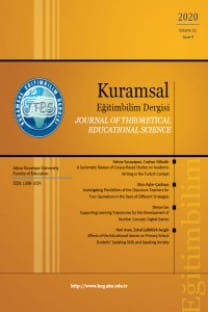Öğrencilerin Kimyasal Tepkimelerde Hız Konusundaki Kavramsal Algılamalarında Örnek Olaya Dayalı Öğretimin Etkisinin Araştırılması
Bu çalışma, kimyasal reaksiyonlarda hız konusundaki örnek olaya dayalı öğretim yönteminin öğrencilerin kavramsal algılamaları ve kavramsal değişimleri üzerindeki etkisini saptamak amacıyla yürütülmüştür. Bu amaç doğrultusunda, 2013-2014 öğretim yılı güz dönemimde İzmir il merkezindeki bir Anadolu Lisesinde 11. sınıflarda öğrenim gören iki sınıftan biri deney grubu (n=26), diğeri kontrol grubu (n=22) olarak rastgele seçilmiştir. Deney grubunda Kimyasal Reaksiyonlarda Hız konusu örnek olaya dayalı öğretim ile, kontrol grubunda ise Kimya öğretim programındaki etkinliklerle işlenmiştir. Çalışmada veri toplama aracı olarak Çakmakçı (2005) tarafından geliştirilmiş olan kavram testi kullanılmıştır. Kavram testi, öğretim öncesi ve sonrası deney ve kontrol gruplarına eş zamanlı olarak uygulanmıştır. Kavram testinden elde edilen veriler, hem nitel hem de nicel olarak analiz edilmiştir. Araştırma sonucunda, gruplar arasında deney grubu lehine anlamlı bir farkın olduğu ortaya çıkmıştır. Ayrıca, örnek olaya dayalı öğretimin, kavramsal değişimi sağlamada ve öğrencilerin kavramsal algılamalarının istenilen düzeylerde olmasında, daha etkili olduğu da belirlenmiştir.
Anahtar Kelimeler:
kavramsal algılama, kavramsal değişim, kimyasal tepkimelerde hız, örnek olaya dayalı öğretim
Investigating the Effectiveness of Case-based Learning Instruction on Students’ Understanding the Subject of Reaction Rate*
This study has been carried out to determine the effectiveness of case-based learning related to reaction rate on students’ conceptual understanding and conceptual change. In this respect, a class of 11th grade students in an Anatolian High School in the center of Izmir city was chosen randomly as experimental group (n=26) and another as control group (n=22). Reaction rate unit was taught to the experimental group within case-based learning method, and to the control group through activities defined in Chemistry curriculum. Comprehension Test developed by Cakmakci (2005) was utilized as data collecting instrument. The Comprehension Test was applied simultaneously to both experimental and control groups before and after the teaching. The data collected via the Comprehension Test was analyzed in terms of both quantity and quality. As a result of the study, it was noted that there was a significant difference between the groups after the instruction in favor of the experimental group. Also, it was determined that case-based learning was more effective in promoting conceptual change and assuring higher level of conceptual understanding for students.
- ISSN: 1308-1659
- Yayın Aralığı: Yılda 4 Sayı
- Başlangıç: 2008
- Yayıncı: Afyon Kocatepe Üniversitesi Eğitim Fakültesi
Sayıdaki Diğer Makaleler
Oktay AKBAŞ, Serap Nur CANOĞLU, Mustafa CEYLAN
Aysel Ünal SÜMEN, Gülten ŞENDUR
Geçiş Sürecinde İletişimi Artırmak: Edublog’lar Yardımcı Olabilir mi?
Janice J. SEABROOKS-BLACKMORE, Karen B. PATTERSON, Kristine W. WEBB, Gwendolyn J. WILLIAMS
Süleyman Nihat ŞAD, Kübra AÇIKGÜL, Kenan DELİCAN
Matematik Özyeterlik Algısının Matematik Öğretmeye Yönelik Kaygıya Etkisi
